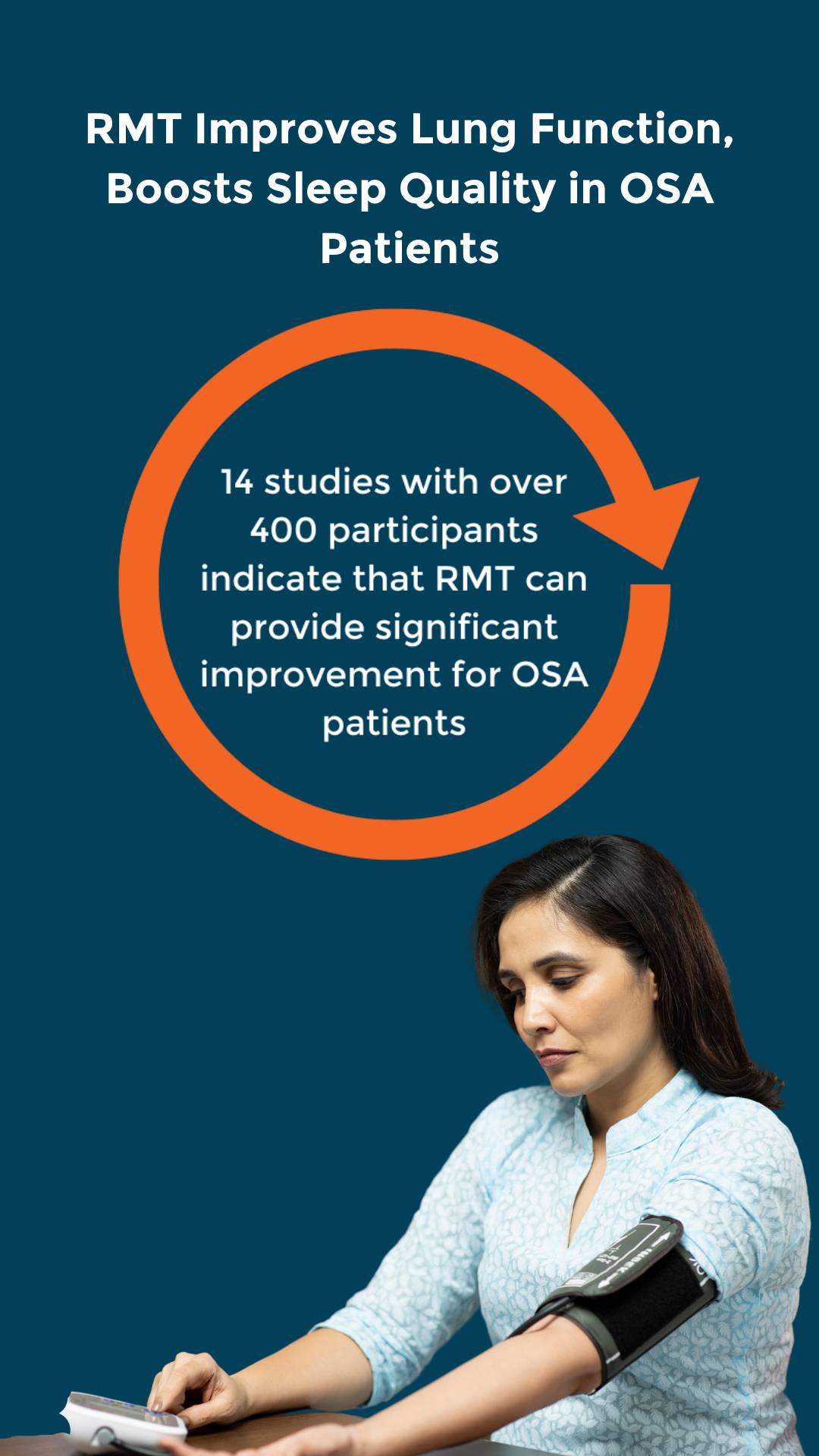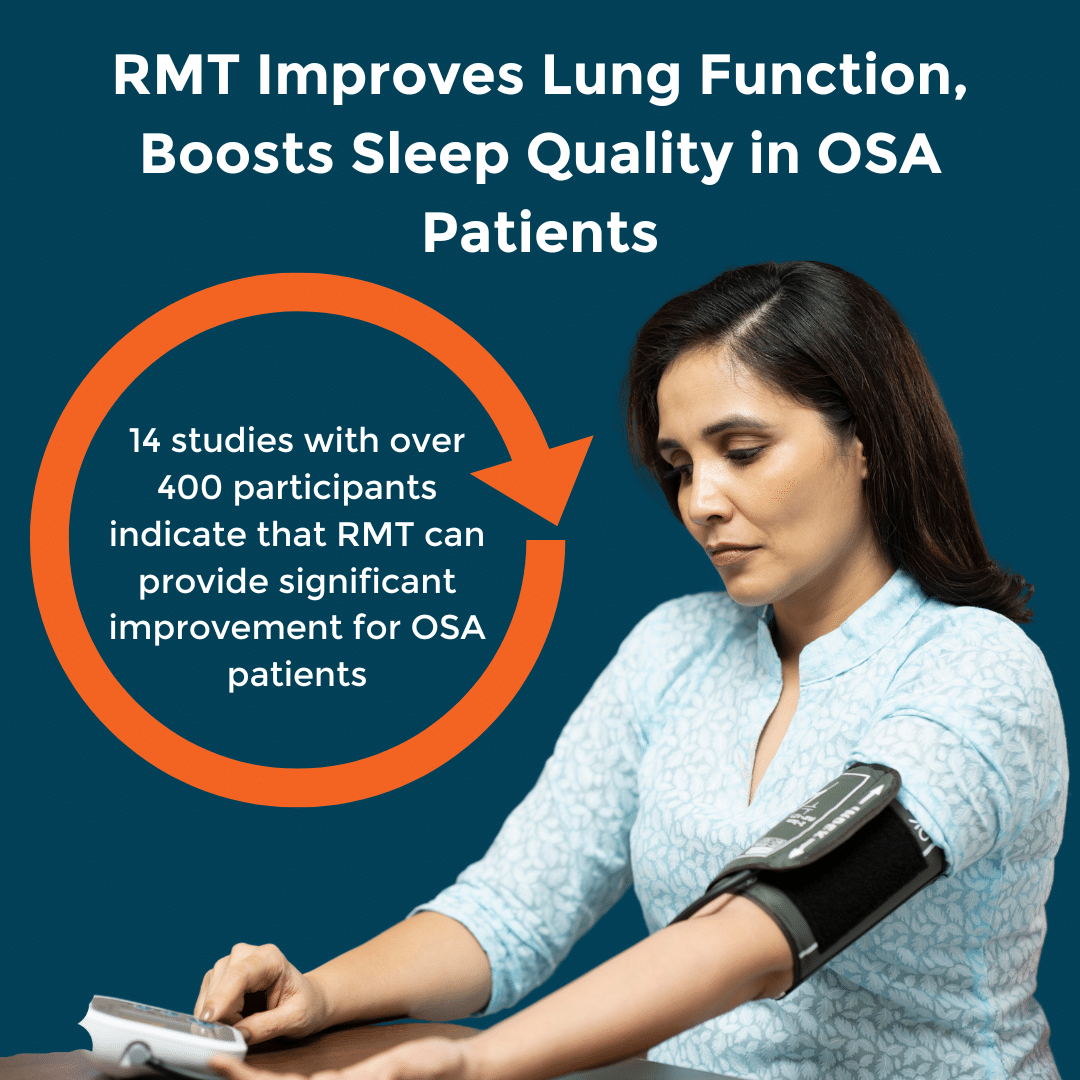CLINICAL CONTEXT AND KEY FINDINGS
- The cessation of sleep due to complete or partial obstruction of upper air passages is the characteristic symptom of obstructive sleep apnea (OSA)
- Hypertension has been reported in more than 50% of the OSA patients.
- The asphyxia resulting from airway obstruction leads to increased inspiratory muscle load which results in decreased functioning of inspiratory muscles, poor sleep quality, increased daytime sleepiness, and lung function.
- Respiratory muscle training (RMT) causes a significant improvement in inspiratory muscle strength, lung function, and sleep quality with a significant decrease in daytime sleepiness, blood pressure, and serum levels of catecholamines in OSA patients

WHY ARE THESE STUDIES IMPORTANT?
Breathlessness, apnea, and underlying hypertension issues are the troublesome aspects of OSA that can result in poor quality of life and may cause mortality due to cardiovascular problems. The available treatments for OSA are continuous positive airway pressures (CPAP), surgical interventions, and oral or nasal devices – all of them are neither cost-effective nor easy to handle. Instead of these complex interventions, there is an emerging body of evidence on respiratory muscle training (RMT) for its effectiveness in OSA.
Two teams of researchers independently evaluated the effects of inspiratory muscle training (IMT) on OSA in two different meta-analyses. One meta-analysis included 7 studies with more than 250 participants and the second meta-analysis included 7 studies with 160 participants. Both of these meta-analyses revealed that RMT is effective in improving pulmonary function, hypertension, and sleep quality in OSA patients.
BACKGROUND
OSA is a sleep disorder that occurs due to the obstruction of the upper airways and causes complete breathlessness or shortness of breath while sleeping (1). The risk factors of OSA are similar to that of cardiovascular diseases and OSA is associated with increased cardiovascular morbidity and mortality (2–4). About 50% of OSA patients have hypertension issues (5). The global prevalence of OSA ranges from 9 to 38%, which are alarming levels (6).
The labored breathing due to obstructed airways in OSA put pressure on inspiratory muscles leading to weakness and decreased functioning of these muscles (7). These factors cause poor lung functioning during sleep, asphyxia, poor sleep quality, and daytime sleepiness which results in arterial stiffness via increased oxidative stress, sympathetic activation, and endothelial dysfunction, thus, increasing the chances of cardiovascular problems in OSA patients (8).
CPAP is considered a primary treatment for OSA in which air is provided at a pressure that ensures the opening of airways to provide continuous and effortless breathing. Moreover, some surgical interventions and oral or nasal devices have also been introduced for the treatment of OSA. However, there is less compliance of OSA patients with these treatments as these are not cost-effective, difficult to maintain, and may cause complications. Recently, the use of RMT devices has been found to be effective in improving respiratory muscle strength and performance, blood pressure, and sleep quality in OSA patients.
META-ANALYSES OF STUDIES FOR THE EFFECT OF IMT IN OSA PATIENTS
The effect of IMT on OSA patients has been evaluated by two independent teams of 10 researchers in two different meta-analyses. The first team from Jamia Millia Islamia, Centre for Physiotherapy and Rehabilitation Sciences, New Delhi, India consisted of three researchers who investigated 953 studies to find the effects of IMT in OSA patients. They selected 7 studies with varying numbers of participants (more than 250 participants in all studies) to assess the effect of IMT on OSA.
The second team, including 7 researchers from Taiwan and Landon, screened 126 publications to evaluate the effects of IMT on blood pressure and sleep quality in OSA patients and they selected 7 studies with 160 patients for their meta-analysis.
All the studies selected for these meta-analyses were randomized control trials (RCTs). The researchers conducted meta-analyses on the effects of IMT on inspiratory muscle strength, the severity of disease, sleep quality, daytime sleepiness, lung function, exercise capacity, blood pressure, and plasma catecholamine levels (because these have effects on heart rate and blood pressure) in mild to severe OSA patients.
RESULTS OF THE META-ANALYSIS
The effect of IMT on sleep quality was assessed by 6 studies in one meta-analysis and 5 studies in the second meta-analysis. Both of these meta-analyses individually reported a significant improvement in the sleep quality of OSA patients by IMT. The effect of IMT on daytime sleepiness was assessed by 4 studies in one meta-analysis and 3 studies in the second meta-analysis, and both of these meta-analyses showed a significant decrease in daytime sleepiness by IMT.
Inspiratory muscle strength was reported by 6 studies in one meta-analysis and 3 studies in the second meta-analysis. Both meta-analyses showed a significant improvement in inspiratory muscle strength by IMT. For lung function assessment, 3 studies were assessed in one meta-analysis and the researchers found that IMT had moderate to significant improvement in lung function in OSA patients.
In the second meta-analysis, 3 studies analyzed systolic and diastolic blood pressures. The meta-analysis of these studies showed that systolic and diastolic blood pressures were significantly lower in the IMT group than in the control group after the training period. The analysis of two studies showed that plasma levels of catecholamines were significantly lower in the IMT group than in the control group.
DISCUSSION AND CONCLUSION
The use of IMT as an adjunct treatment for OSA patients improves inspiratory muscle strength, sleep quality, daytime sleepiness, blood pressure, serum levels of catecholamines, and lung function. These results are in coordination with another meta-analysis where researchers also concluded that IMT improved sleep quality, sleepiness, and inspiratory muscle strength in OSA patients (11). Moreover, IMT can also be assessed for its long-term effects on the severity of OSA.
RMT is effective in relieving short-term symptoms in OSA patients by improving inspiratory muscle strength, lung function, and quality of sleep, and decreasing blood pressure, serum levels of catecholamines, and daytime sleepiness.
References:
- White DP. Pathogenesis of obstructive and central sleep apnea. Am J Respir Crit Care Med. 2005 Dec 1;172(11):1363–70.
- Shah NA, Yaggi HK, Concato J, Mohsenin V. Obstructive sleep apnea as a risk factor for coronary events or cardiovascular death. Sleep and Breathing. 2010 Jun 1;14(2):131–6.
- Gottlieb DJ, Yenokyan G, Newman AB, O’Connor GT, Punjabi NM, Quan SF, et al. Prospective Study of Obstructive Sleep Apnea and Incident Coronary Heart Disease and Heart Failure. Circulation. 2010 Jul 27;122(4):352–60.
- Yaggi HK, Concato J, Kernan WN, Lichtman JH, Brass LM, Mohsenin V. Obstructive Sleep Apnea as a Risk Factor for Stroke and Death. N Engl J Med. 2005 Nov 10;353(19):2034–41.
- Ahmad M, Makati D, Akbar S. Review of and Updates on Hypertension in Obstructive Sleep Apnea. Int J Hypertens [Internet]. 2017 Sep 24 [cited 2023 Jan 28];2017. Available from: https://www.hindawi.com/journals/ijhy/2017/1848375/
- Senaratna CV, Perret JL, Lodge CJ, Lowe AJ, Campbell BE, Matheson MC, et al. Prevalence of obstructive sleep apnea in the general population: A systematic review. Sleep Med Rev. 2017 Aug 1;34:70–81.
- Chien MY, Wu YT, Lee PL, Chang YJ, Yang PC. Inspiratory muscle dysfunction in patients with severe obstructive sleep apnoea. Eur Respir J. 2010 Feb 1;35(2):373–80.
- Zhang W, Si LY. Obstructive sleep apnea syndrome (OSAS) and hypertension: pathogenic mechanisms and possible therapeutic approaches. Ups J Med Sci. 2012 Nov;117(4):370–82.
- Dar JA, Mujaddadi A, Moiz JA. Effects of inspiratory muscle training in patients with obstructive sleep apnoea syndrome: a systematic review and meta-analysis. Sleep Science. 2022;15(4):480.
- Chen TA, Mao ST, Lin HC, Liu WT, Tam KW, Tsai CY, et al. Effects of inspiratory muscle training on blood pressure- and sleep-related outcomes in patients with obstructive sleep apnea: a meta-analysis of randomized controlled trials. Sleep Breath [Internet]. 2022 Dec 28; Available from: http://dx.doi.org/10.1007/s11325-022-02773-1
- Torres-Castro R, Solis-Navarro L, Puppo H, Alcaraz-Serrano V, Vasconcello-Castillo L, Vilaró J, et al. Respiratory Muscle Training in Patients with Obstructive Sleep Apnoea: A Systematic Review and Meta-Analysis. Clocks & Sleep. 2022 Apr 11;4(2):219–29.
LINKS
Feb 7th 2023

0 Comments